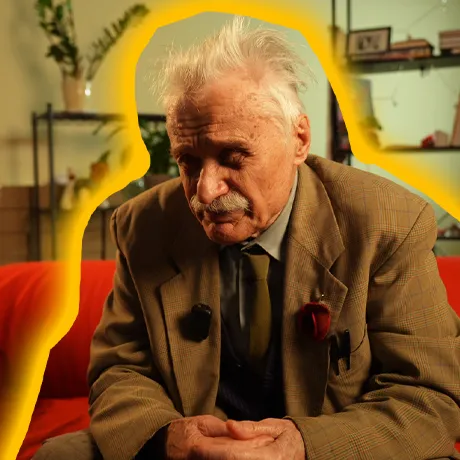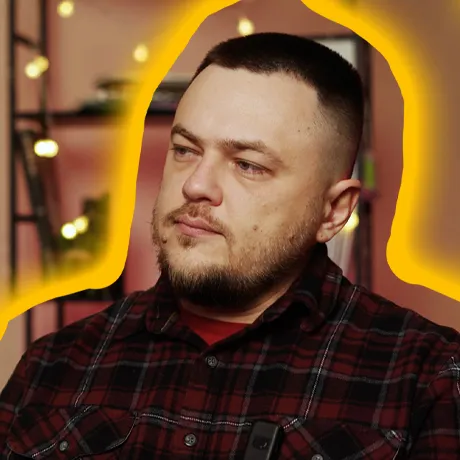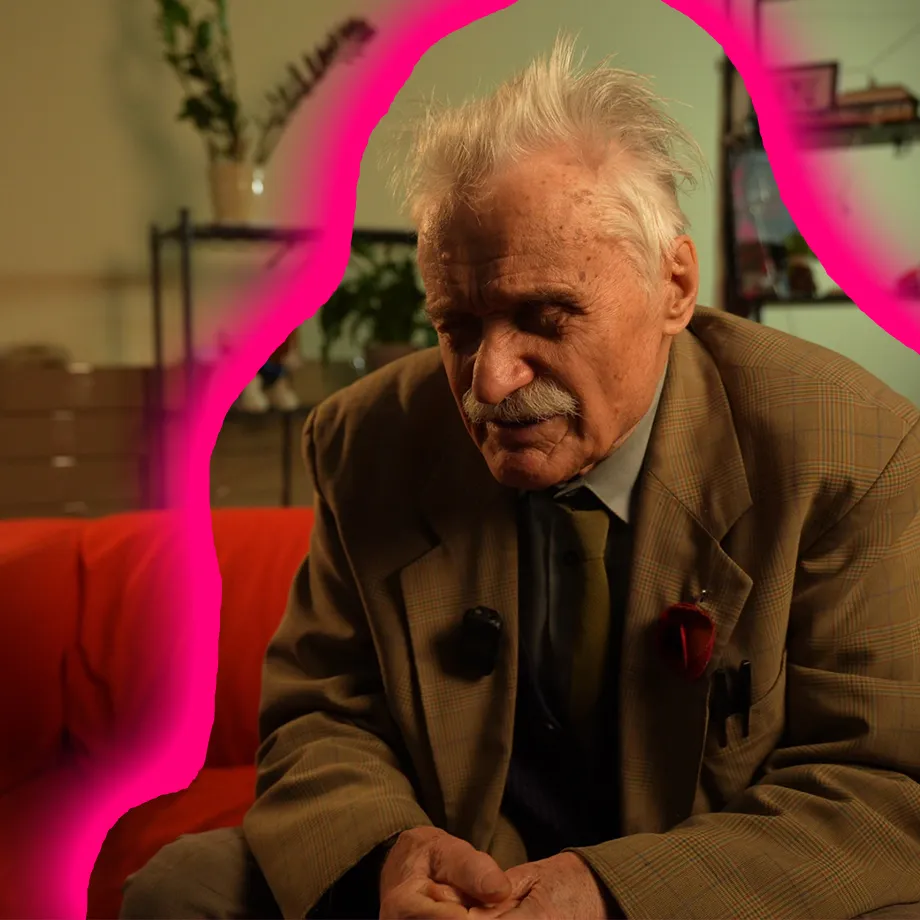
Joe Linsley: podcasts about Ukraine, coffee shops and volunteering. Strangers Not Strangers
With the beginning of the full-scale invasion, more and more foreigners are coming to Kharkiv. They are volunteers, journalists and soldiers, who decided to come to Ukraine and help here firsthand. They are people with interesting biographies and strong positions, but their stories are not available to everyone due to the language barrier.
Together with Hotspot School of English, we will introduce these people and their stories to you. The second hero is Joe Linsley, an American journalist. Every day for the last two years he has ten minutes on WGN radio in Chicago — one of America’s biggest radio stations. There Joe has been telling Americans about the war in Ukraine.
Ви також можете прочитати цей матеріал українською.
“Kharkiv shows the possibility of Victory, and Americans need to see that possibility”
— Tell me a bit about yourself, please. Where are you from? What do you do for a living and what are you doing here in Ukraine?
Well, I am Joe Linsley, and our team is called “Ukrainian Freedom News”. Every day and weekday, for the last two years, I have had ten minutes on WGN radio in Chicago — one of America’s biggest radio stations. I travel around Ukraine and tell Americans about the war and my personal experience of living in your country.
We raise money to get supplies to the frontline, and that gives us access to great stories that keep people emotionally engaged.
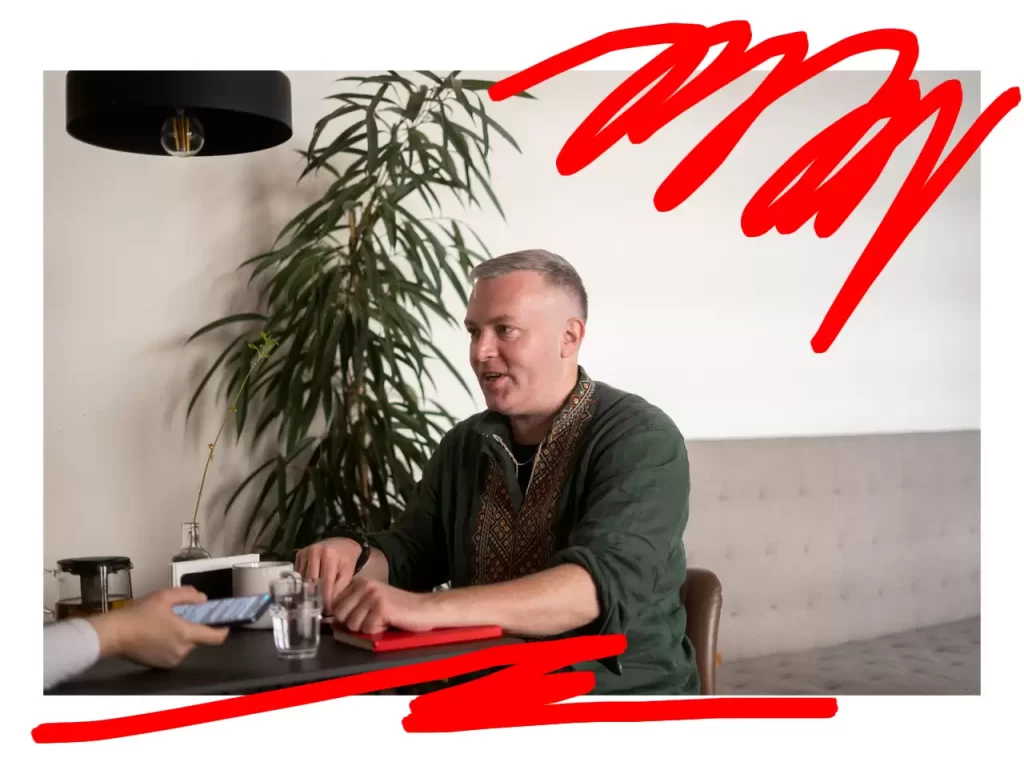
— You are staying in Kharkiv right now. Why Kharkiv? What attracts you?
The reason I come to Kharkiv as often as possible is because this city shows the possibility of Victory, and Americans need to see that possibility.
At the very beginning of the full-scale invasion, it was enough to show how evil Russia is. People said we have to stop it. That was enough for a little while, but not now. Now people need to see things that work. They need to see signs of success otherwise. And that’s a harsh reality: it’s like a mountain that seems too impossible to climb, and people feel demotivated. You know, time goes on. People have their problems. And if they don’t see the possibility [to influence the situation, — ”Lyuk Media”], they lose energy.
And this city, Kharkiv, I mean… right now, we are here in this cafe on the street that was under missiles a few months ago [cafe Makers, Hryhoriya Skovorody Street, 36. The Russians struck the street on January 23 with S-300 missiles. At least nine people were injured in the attack]. And now we have the boarded-up window behind us. A sign of the tragedy of how evil Russia is in attacking wonderful cities. But this is also a sign of victory. We have to have small victories and that’s how we eventually get to the big idea of «Перемога» [“Victory” in Ukrainian]. I love the meaning of that word, the construction of it in Ukrainian, something like overcoming the possibility, overcoming your power, doing the impossible. And this place shows that.
— Were you here, in this cafe, after the attack?
I came here after those missiles hit this street. I was nearby, so I felt it. And then the next morning I came to this cafe to see what had happened. It was open on time. They [the staff] remembered me, they smiled. “Do you want your usual coffee?’, — they asked.
You know, I think in America you would take a mental health day off. Your business was attacked and there was still glass on the floor! They were sweeping up. They were boarding up the windows. As soon as you only read the headlines about that [attack], Kharkiv was attacked again, and you saw the beautiful buildings destroyed again and you heard about the people who were killed. Again.
It seems impossible, but when you’re physically here, you go to the shop and see people helping, hugging, encouraging each other and rebuilding right away, it changes your whole dynamic. So that’s one of the reasons why I’m here so often. Because this city shows us that Victory is happening. It’s a process.
— How do Americans react to your radio messages about Ukraine and shelling?
We have an incredibly loyal audience in Chicago. I mean, people donate money. The other reason why I came here this time was because we’ve been buying anti-drone backpacks, with the Kharkiv charity “Volonterska” and [Kharkiv entrepreneur] Max Burtzev. And we have Americans who want to protect the frontline soldiers while we wait for long-range weapons.
My goal is to convince Americans who say they love freedom but who ignore Ukraine, to open their eyes and change their minds. My target audience now is Austin, Texas, because that’s the capital of tech. It’s Joe Rogan, it’s Elon Musk. It’s the most powerful city in America, and they pay for the people in Congress. Our mission now is to work with Ukrainians and those who support Ukraine, not to let the Russians control the narrative, and to show Americans the possibility of Victory every single day.
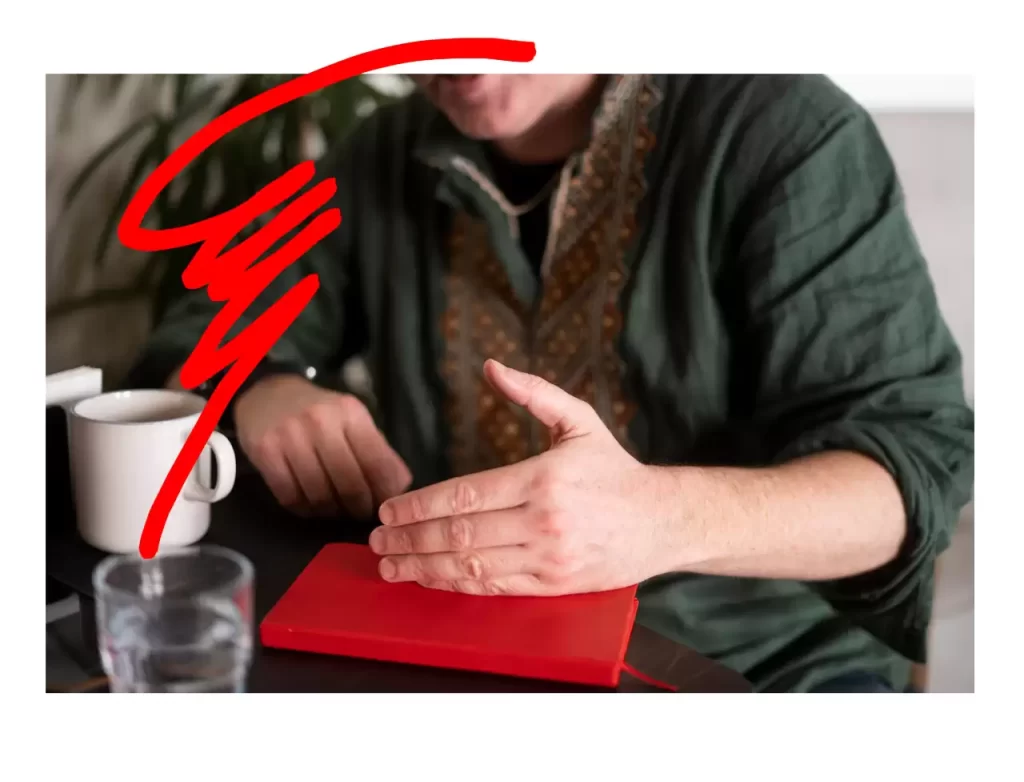
— Could you tell me more about your motivation to stay here during the war, how did it start?
I first came here in 2018. I went to Kyiv, and I was about to bring American entrepreneurs there for small trips. And so I got to know Ukraine during those few years… I was traveling around the world for a few years, and I was invited to give a lecture at a Ukrainian Catholic University in Lviv about media. And so I flew from Stockholm, thinking I’d be here [in Ukraine] for two weeks. But now I’ve been here through a pandemic and the full-scale invasion.
January 2022. Time to go back to the US. Everyone knew there was a build-up to the full invasion. And that’s when I said: “Okay, I’ve had a nice few years of traveling around, and now time to get back to journalism. This is my mission. I believe in this country. I understand it, so I can explain it to Americans”. I perceived this as a new adventure. I was ready for it. And I was in Lviv when the full-scale invasion began.
— You said journalism is your mission. How did your career begin?
I started as a journalist in a magazine in Washington. But one of my first really big jobs was at Fox News. And the guy who founded Fox News, Roger Ailes, helped get Ronald Reagan, George Bush and Richard Nixon elected. And this guy was a legend. I became his protege. He was my mentor. He taught me how to take over the company, and I was like… 20-22 years old? All of a sudden, I’m in this position of power, the most powerful media empire in the world. It seemed unreal.
It was a wild world of private jets and power. I had somehow achieved the dream pretty quickly. Though I had no freedom, they controlled everything. I began to see a lot of problems, and this is part of why I’m here now — because they had all the resources in the world, but they didn’t know the world. Yet they controlled the narratives and the news, they didn’t care about the search for truth.
And so I wanted to quit, but it’s like… the mafia. You can’t. They said you can’t leave. I knew all their secrets, and so they chased me. I escaped. It was a car chase to the Hudson Valley. It was crazy. And then they made a TV show with Russell Crowe as my old boss, and some actor played me. And that’s why I left America. When the show premiered, I got a one-way ticket and left to travel the world. So that’s how I ended up in Ukraine.
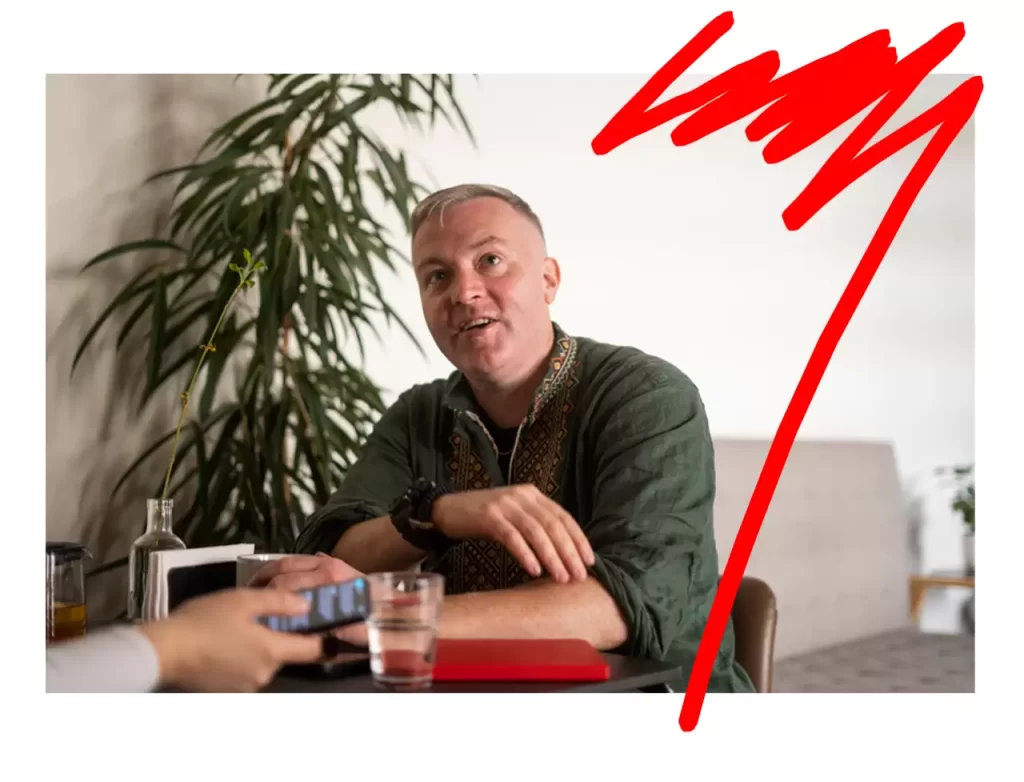
— And what would you say about other foreigners (your friends, acquaintances) who have decided to come to Ukraine? Do you know about their motivation?
I think, well, Ukraine is the best self-help. And I see that for everyone here. And then for the Americans who come here, whether they’re like conservative veterans of Afghanistan, you know, serious warriors or liberal professors from Harvard University — they all come here and find some meaning and purpose for their development. We all have dark times when we’re just tired of everything and want to get away, you know.
I see with my foreign friends who are here, like, when people come here, they don’t feel that this [life in Ukraine] is hopeless. They feel quite the opposite. When you drive through destroyed villages, you see sadness and tragedy, but on the highways you see military and civilian vehicles, and [you see] license plates from all over Europe. It inspires.
“You must have some sense of calm and cheerfulness to sound like a Ukrainian”
— I also wanted to talk more about some locations in Kharkiv. When I asked you to choose any place in Kharkiv, like your favorite one, you immediately told me about “Trypichia” and “Makers”. Why are these places?
“Trypichia” stands for “three ovens”. It’s an amazing place because it started (like so many things here) as a volunteer project at the beginning of the full-scale invasion, and now it’s this. We can call it a restaurant, but it’s so much more than that. It’s a hub of cultural renaissance. And, you know, the Soviets did so much to destroy language, culture and identity in Kharkiv, and Mykyta [Vyrchenko, the co-founder of “Trypichia”] and the team have revived old Ukrainian recipes in innovative ways. They also bring musicians from all over the country, and it has become a place of resistance. You feel this great energy, and there are always great people all together.
‘Makers’ here. We have already mentioned the shelling. But, hey, I like great coffee. And, you know, we [Americans] have quite a negative image [of Ukraine] because we don’t see the positive side of living here. When it’s quiet, no missile attack, no air raid alarms, when it’s safe to walk these streets because you’re not going to get shot or robbed. We lack those stories. This city is a perfect place to show the big picture, the microcosm of the reality that we face. And I was here after the missile attack, in January, on this street. By the way, it changed its name…
— It used to be called Pushkinska Street, after the Russian poet, but it was named after Skovoroda, the Ukrainian philosopher.
Yeah. And the mayor allowed it, really. He changed [the name of the street] after the attack there.
I think that’s because Ukrainians have shown that everything is possible. In American football and American baseball, in both of those sports, you can see at any moment the actual progress. You can see the little wins that constitute, that push you toward the big Victory. And, okay, first down, second down, third down. And that’s what we get to focus on in telling stories about your country, step by step. Yeah. “Malo pomalu” [smiles].
— Oh, I was about to ask you about the language. When did you start learning Ukrainian, how are you progressing?
Every country I go to, I always try to learn a bit of the language. I was living in Lviv, so Lviv is sort of a center of the Ukrainian language, I feel. I am an Irish-American, I used to have a farm in Ireland. You know, the Irish language has been suppressed, and no one speaks it anymore. Some people do, of course, but it’s not common. And so the Irish part of me said: “Oh, I want to! I must join the effort to speak Ukrainian. It will help you understand the place”.
You can also see the real difference between Russians and Ukrainians on a bookshelf. I used to love [Fyodor] Dostoevsky. I think he diagnosed the Russian mental illness very well, even if he was a part of it to some extent. He wrote ‘Crime and Punishment’, and I thought like: “Okay, I don’t know Russian, but the Russian word for a crime literally means “over the line” (in translation)”. So that’s a Russian word. And the Ukrainian word means “doing something evil”. This is incredible. It shows you the vast difference between these two countries, just in that one word.
For Russians, a crime is stepping over a line drawn by the authorities. It’s all about the regime. It doesn’t matter what you feel in your heart, there’s a line set by whoever (the tsar, Stalin or Putin), you just have to shut up and not cross that line. For Ukrainians, a crime is doing something that you know in your heart to be evil. That’s why you will disobey a bad regime, this is a wild spirit of freedom here. That’s your Maidan revolution [the Revolution of Dignity]. You only care about good and evil.
Anyway, Ukrainian language. So the language is a code? No, it’s like a key. It unlocks the door to understanding the difference in mentality. That’s why I like it.
— Was it hard for you to learn Ukrainian?
Yeah. It still is. I mean, it’s hard. It’s hard to pronounce.
— What’s the hardest to pronounce for you?
Probably the sound of an “x” and “г”, like in “гуцул”. And the difference between “холодний” [cold] and “голодний” [hungry]. It’s hard to get that soft between hard and soft [sounds].
Well, at the beginning of the full scale invasion, I couldn’t say one word. It’s very hard to pronounce, I’ll try it. The word that Russians cannot say. “Palyanytsia”.
— You almost did it!
Almost, yeah. If I have some “samohonka” [moonshine], I can say it.
But, yeah, the pronunciation. I realized it’s because I studied a bit of ancient Greek, Arabic and French. I never mastered any of them, but I was always moving around. But to speak Ukrainian, to pronounce it, I cannot talk like a New Yorker. I can’t talk with that anger like I used to.
Some friends were trying to get me to talk [Ukrainian] the other day, but you must have some kind of sense of calm and cheerfulness to sound like a Ukrainian. And so this shows you how the language is tied to identity, to your worldview. It reflects the way people live.
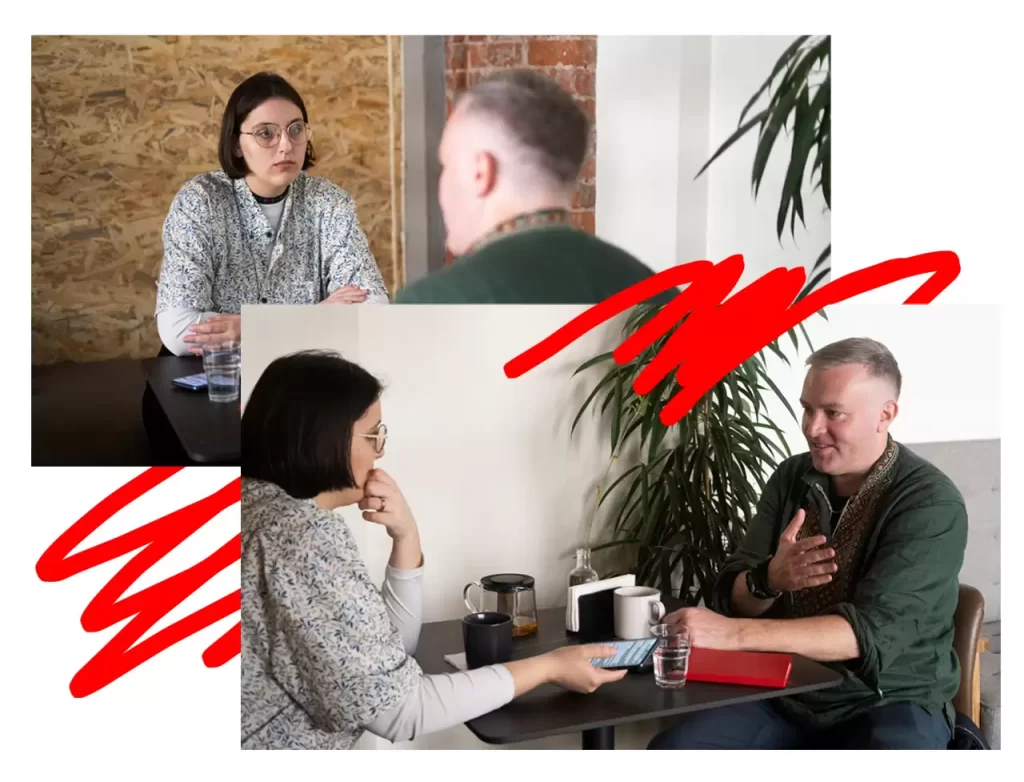
— Do you have any funny stories about the Ukrainian language, maybe mispronouncing some words or not understanding them?
Nothing that sticks out, especially. But always, I’m sure, there are, but nothing I can recall right now.
Anyway, I am trying to read now some poems by Taras Shevchenko that I was trying to memorize. Let’s see. Oh, I forgot the first word. “Побачиш багато, поїдеш далеко. Зажурився…” That’s hard to say. I can’t say it.
— And have you read any other Ukrainian writers or poets?
Unfortunately, no. I’ve read a little bit of [Mykola] Gogol. But I haven’t had the time to read much. I read Shakespeare for some sanity and perspective. And then I read a book from the 1930s because we’re in the same sort of scenario right now. I just read the same books over and over again. So I need to read Ukrainian literature. Maybe “pislya Peremohy” [after Victory]. I’ll have time.
— So the last questions, I guess. What is Kharkiv for you now?
Kharkiv is a place of possibility, a place of doing the impossible. That’s it. Kharkiv is a place that every day proves that the impossible is possible in big and small ways.
And that’s why I encourage everyone who is lost in life and looking for meaning and purpose to not only come to Ukraine, but also come to Kharkiv. You have to face fears, as we do in life anyway. And so everything is very concentrated, real and honest here.
— How can you imagine the future of Kharkiv?
The future is every day. The future is where we are right now. This boarded-up window, for example. There are so many details, it’s too much to take in, and you miss a lot of stuff. But when it’s twilight, cloudy and a dark time, you begin to see. You can see these little details.
And I think that’s what we feel here in Kharkiv. We see in the shadows and amid the attacks, we see new elements of ourselves every day. This is a future city already, I think, if you can handle this sort of spirit, you can handle anything that the future might bring. Even aliens, whatever that might be.
Hotspot is a result-oriented school of English. They develop sustainable and conscious skills in these three aspects: grammar (to avoid nonsense in writing or speaking), speaking (to use words and rules correctly and appropriately) and listening (to understand people around and to be understood).
Hotspot’s big idea is to teach people how to study. Hotspot doesn’t just teach the language, but also helps people to love learning, which in the result might improve the standard of living in our city and country.
Interview — Arysia Chernobai, editing and amends — Oleksandra Ponomarenko, photos — Yurii Kapliuchenko, cover photo — Katya Drozd

